Fleurs du Mal Magazine



With ambitious manipulations of poetic forms, Tyehimba Jess presents the sweat and story behind America’s blues, worksongs and church hymns.
Part fact, part fiction, Jess’s much anticipated second book weaves sonnet, song, and narrative to examine the lives of mostly unrecorded African American performers directly before and after the Civil War up to World War I. Olio is an effort to understand how they met, resisted, complicated, co-opted,
Tyehimba Jess is the author of leadbelly and the Pulitzer Prize–winning Olio. leadbelly was a winner of the 2004 National Poetry Series. Library Journal and Black Issues Book Review both named it one of the “Best Poetry Books of 2005.” Jess’s second book, Olio, won the 2017 Pulitzer Prize in Poetry, the 2017 Anisfield-Wolf Book Award in Poetry, and the 2017 Book Award for Poetry from the Society of Midland Authors. It was also a finalist for the 2016 National Books Critics Circle Award, 2017 PEN/Jean Stein Book Award, and the 2017 Kingsley Tufts Poetry Award. Library Journal called it a “daring collection, which blends forthright, musically acute language with portraiture” and Publishers Weekly, in a starred review, called it “Encyclopedic, ingenious, and abundant” and selected it as one of the five best poetry books of 2016.
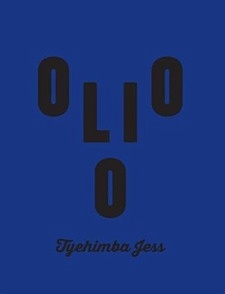 Jess, a Cave Canem and NYU alumnus, received a 2004 Literature Fellowship from the National Endowment for the Arts, and was a 2004-2005 Winter Fellow at the Provincetown Fine Arts Work Center. Jess is also a veteran of the 2000 and 2001 Green Mill Poetry Slam Team, and won a 2000 – 2001 Illinois Arts Council Fellowship in Poetry, the 2001 Chicago Sun-Times Poetry Award, and a 2006 Whiting Fellowship. He exhibited his poetry at the 2011 TEDxNashville Conference. Jess is the Poetry and Fiction Editor of the African American Review and is Associate Professor of English at College of Staten Island.
Jess, a Cave Canem and NYU alumnus, received a 2004 Literature Fellowship from the National Endowment for the Arts, and was a 2004-2005 Winter Fellow at the Provincetown Fine Arts Work Center. Jess is also a veteran of the 2000 and 2001 Green Mill Poetry Slam Team, and won a 2000 – 2001 Illinois Arts Council Fellowship in Poetry, the 2001 Chicago Sun-Times Poetry Award, and a 2006 Whiting Fellowship. He exhibited his poetry at the 2011 TEDxNashville Conference. Jess is the Poetry and Fiction Editor of the African American Review and is Associate Professor of English at College of Staten Island.
Jess’ fiction and poetry have appeared in anthologies such as Angles of Ascent: A Norton Anthology of Contemporary African American Poetry, Beyond The Frontier: African American Poetry for the Twenty-First Century, Role Call: A Generational Anthology of Social and Political Black Literature and Art, Bum Rush the Page: A Def Poetry Jam, Power Lines: Ten Years of Poetry from Chicago’s Guild Complex, Slam: The Art of Performance Poetry. His poetry has appeared in journals such as American Poetry Review, Brilliant Corners, Ploughshares, Obsidian III: Literature in the African Diaspora, Warpland: A Journal of Black Literature and Ideas, Mosaic, American Poetry Review, Indiana Review, Nashville Review and 580 Split.
A tremendous, and tremendously accessible, book of poetry.
Molly McArdle, Brooklyn Magazine
[Olio is] something people who care for the music, or for African American cultural history, will read and reread, whether or not they notice its ambitious expansions of what has been possible for the contemporary poem.
Stephen Burt, American Poets
OLIO
By Tyehimba Jess
Publication Date: April 2016
Publisher: Wave Books
Website: https://www.wavepoetry.com/
ISBN# 9781940696201 (7×10 224pp, paperback)
ISBN# 9781940696225 (7×10 224pp, limited edition hardcover)
PAPERBACK TEMPORARILY SOLD OUT – Books will be back in stock in June. This includes both paperback and a limited number of hardcover copies. Preorders are currently open for the hardcover below; just place your hardcover order, and we will ship the book to you in June. Paperbacks can be ordered once the book is back in stock.
fleursdumal.nl magazine
More in: - Book News, Archive I-J, Art & Literature News
 De ‘Elegy Written in a Country Churchyard’ van Thomas Gray (1716-1771), voltooid in 1750, is een van de allerbekendste gedichten uit de Engelse literatuurgeschiedenis.
De ‘Elegy Written in a Country Churchyard’ van Thomas Gray (1716-1771), voltooid in 1750, is een van de allerbekendste gedichten uit de Engelse literatuurgeschiedenis.
Typisch voor de 18de eeuw generaliseert en moraliseert de dichter naar hartelust in ‘poëtische’ taal.
Toch illustreert zijn tekst ook op frappante maar voorzichtige wijze trends die tot de ‘allerindividueelste emoties’ van de Romantiek zouden leiden.
‘Far from the madding crowd’ (later geleend door Thomas Hardy als romantitel) stelt de hooggeleerde dichter zich voor eenzaam door het dorpsgebied te zwerven en tenslotte op het dorpskerkhof begraven te liggen.
William Blake (1757-1827), auteur van de beroemde Songs of Innocence and of Experience (1795), sneed in 1797 de tekst van Gray’s Elegy uit een uitgave van Gray’s poëzie uit 1790, bevestigde die in uitsparingen van aquarelbladen en schilderde zo elf bladen met een illustratie rondom de tekst.
Een bekende uitspraak van Blake is ‘wie generaliseert is een idioot’, maar in Gray’s gedicht zag hij blijkbaar vooral de individuele en romantische kant ervan. Zo ontstond een uniek eenmalig product voor een opdrachtgever, dat pas in 1920 in de publiciteit kwam.
Gray’s originele strofen en de naar vorm en inhoud getrouwe Nederlandse vertaling van Cornelis W. Schoneveld staan onder elkaar, naast Blake’s esoterische illustraties.
Far from the madding crowd’s ignoble strife,
Their sober wishes never learned to stray;
Along the cool sequestered vale of life
They kept the noiseless tenour of their way.
Yet e’en these bones from insult to protect
Some frail memorial still erected nigh,
With uncouth rhymes and shapeless sculpture decked,
Implores the passing tribute of a sigh.
x Their name, their years, spelt by the unlettered Muse,
The place of fame and elegy supply:
And many a holy text around she strews,
That teach the rustic moralist to die.
For who, to dumb forgetfulness a prey,
This pleasing anxious being e’er resigned,
Left the warm precincts of the cheerful day,
Nor cast one longing lingering look behind?
Thomas Gray
Ver van het twistend volk, in dwaas verval,
Zwierven hun sobere wensen nooit van huis;
In ’t koele afgescheiden levensdal
Hielden zij koers, zonder het minst geruis.
Ter wering van hun beenderen tegen kwaad
Verzoekt een wrakke zerk, hier opgericht,
In grof reliëf en verzen zwak van maat,
Een zucht van de passant als ereplicht.
x Jaren en naam, door ’n Muze slecht gespeld,
Vervangen lofgezang en rouwgedicht,
En menig heilig woord van Haar vertelt
De vrome landman van zijn dood in zicht.
Want wie zei ooit, vergetelheid ten prooi,
Vaarwel tegen ’t bezorgd maar schoon bestaan,
Verliet het dagdomein, zo warm, zo mooi,
Zonder een draalblik talend terug te slaan?
Vertaling Cornelis W. Schoneveld
Thomas Gray
Treurzang geschreven op een dorpskerkhof
Vertaling en voorwoord Cornelis W. Schoneveld
isbn: 978 90 824288 7 2
Uitg. DWT De Wilde Tomaat
2017, 27 pag.
fleursdumal.nl magazine
More in: - Book News, Archive G-H, Blake, William, POETRY IN TRANSLATION: SCHONEVELD

Pierre-Jean de Béranger
Le petit homme gris
Il est un petit homme,
Tout habillé de gris,
Dans Paris ;
Joufflu comme une pomme,
Qui, sans un sou comptant,
Vit content,
Et dit : Moi, je m’en…
Et dit : Moi, je m’en…
Ma foi, moi, je m’en ris !
Oh ! qu’il est gai (bis),
Le petit homme gris !
A courir les fillettes,
A boire sans compter,
A chanter,
Il s’est couvert de dettes ;
Mais quant aux créanciers,
Aux huissiers,
Il dit : Moi, je m’en…
Il dit : Moi, je m’en…
Ma foi, moi, je m’en ris !
Oh ! qu’il est gai [bis),
Le petit homme gris !
Qu’il pleuve dans sa chambre,
Qu’il s’y couche le soir
Sans y voir ;
Qu’il lui faille en décembre
Souffler, faute de bois,
Dans ses doigts ;
Il dit : Moi, je m’en…
Il dit : Moi, je m’en…
Ma foi, moi, je m’en ris !
Oh ! qu’il est gai (bis),
Le petit homme gris !
Sa femme, assez gentille,
Fait payer ses atours
Aux amours :
Aussi plus elle brille,
Plus on le montre du doigt.
Il le voit,
Et dit : Moi, je m’en…
Et dit : Moi, je m’en…
Ma foi, moi, je m’en ris !
Oh ! qu’il est gai (bis),
Le petit homme gris !
Quand la goutte l’accable
Sur un lit délabré,
Le curé,
De la mort et du diable
Parle à ce moribond,
Qui répond :
Ma foi, moi, je m’en…
Ma foi, moi, je m’en…
Ma foi, moi, je m’en ris !
Oh ! qu’il est gai (bis),
Le petit homme gris !
Pierre-Jean de Béranger (1780-1857)
Le petit homme gris
Toutes les chansons de Béranger (1843)
fleursdumal.nl magazine
More in: Archive A-B, Béranger, Pierre-Jean de

D.H. Lawrence
Tortoise Shout
I thought he was dumb,
I said he was dumb,
Yet I’ve heard him cry.
First faint scream,
Out of life’s unfathomable dawn,
Far off, so far, like a madness, under the horizon’s dawning rim,
Far, far off, far scream.
Tortoise in extremis.
Why were we crucified into sex?
Why were we not left rounded off, and finished in ourselves,
As we began,
As he certainly began, so perfectly alone?
A far, was-it-audible scream,
Or did it sound on the plasm direct?
Worse than the cry of the new-born,
A scream,
A yell,
A shout,
A pæan,
A death-agony,
A birth-cry,
A submission,
All tiny, tiny, far away, reptile under the first dawn.
War-cry, triumph, acute-delight, death-scream reptilian,
Why was the veil torn?
The silken shriek of the soul’s torn membrane?
The male soul’s membrane
Torn with a shriek half music, half horror.
Crucifixion.
Male tortoise, cleaving behind the hovel-wall of that dense female,
Mounted and tense, spread-eagle, out-reaching out of the shell
In tortoise-nakedness,
Long neck, and long vulnerable limbs extruded, spread-eagle over her house-roof,
And the deep, secret, all-penetrating tail curved beneath her walls,
Reaching and gripping tense, more reaching anguish in uttermost tension
Till suddenly, in the spasm of coition, tupping like a jerking leap, and oh!
Opening its clenched face from his outstretched neck
And giving that fragile yell, that scream,
Super-audible,
From his pink, cleft, old-man’s mouth,
Giving up the ghost,
Or screaming in Pentecost, receiving the ghost.
His scream, and his moment’s subsidence,
The moment of eternal silence,
Yet unreleased, and after the moment, the sudden, startling jerk of coition, and at once
The inexpressible faint yell
And so on, till the last plasm of my body was melted back
To the primeval rudiments of life, and the secret.
So he tups, and screams
Time after time that frail, torn scream
After each jerk, the longish interval,
The tortoise eternity,
Agelong, reptilian persistence,
Heart-throb, slow heart-throb, persistent for the next spasm.
I remember, when I was a boy,
I heard the scream of a frog, which was caught with his foot in the mouth of an up-starting snake;
I remember when I first heard bull-frogs break into sound in the spring;
I remember hearing a wild goose out of the throat of night
Cry loudly, beyond the lake of waters;
I remember the first time, out of a bush in the darkness, a nightingale’s piercing cries and gurgles startled the depths of my soul;
I remember the scream of a rabbit as I went through a wood at midnight;
I remember the heifer in her heat, blorting and blorting through the hours, persistent and irrepressible;
I remember my first terror hearing the howl of weird, amorous cats;
I remember the scream of a terrified, injured horse, the sheet-lightning
And running away from the sound of a woman in labor, something like an owl whooing,
And listening inwardly to the first bleat of a lamb,
The first wail of an infant,
And my mother singing to herself,
And the first tenor singing of the passionate throat of a young collier, who has long since drunk himself to death,
The first elements of foreign speech
On wild dark lips.
And more than all these,
And less than all these,
This last,
Strange, faint coition yell
Of the male tortoise at extremity,
Tiny from under the very edge of the farthest far-off horizon of life.
The cross,
The wheel on which our silence first is broken,
Sex, which breaks up our integrity, our single inviolability, our deep silence
Tearing a cry from us.
Sex, which breaks us into voice, sets us calling across the deeps, calling, calling for the complement,
Singing, and calling, and singing again, being answered, having found.
Torn, to become whole again, after long seeking for what is lost,
The same cry from the tortoise as from Christ, the Osiris-cry of abandonment,
That which is whole, torn asunder,
That which is in part, finding its whole again throughout the universe.
D.H.Lawrence (1883 – 1930)
Tortoise Shout
fleursdumal.nl magazine
More in: Archive K-L, D.H. Lawrence, Lawrence, D.H.
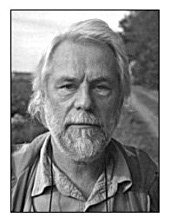
Ton van Reen
Dode Vogel
Een dode vogel
in een droog landschap
De nagels in een laatste kramp
vastgeklemd rond de tak
houden hem overeind in de zon
Kleurige vleugels
bedekken zijn lege lijf
de witte oogkassen
door de wind leeggevreten
Hij is de wachter
die waarschuwt voor de dood
Ton van Reen: Dode Vogel
Uit: De naam van het mes. Afrikaanse gedichten In 2007 verschenen onder de titel: De straat is van de mannen bij BnM Uitgevers in De Contrabas reeks. ISBN 9789077907993 – 56 pagina’s – paperback
fleursdumal.nl magazine
More in: Archive Q-R, Reen, Ton van, Reen, Ton van, Ton van Reen
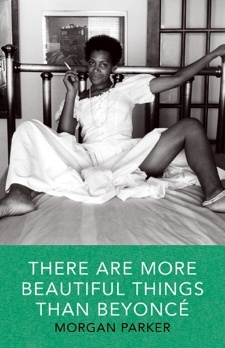 The only thing more beautiful than Beyoncé is God, and God is a black woman sipping rosé and drawing a lavender bath, texting her mom, belly-laughing in the therapist’s office, feeling unloved, being on display, daring to survive. Morgan Parker stands at the intersections of vulnerability and performance, of desire and disgust, of tragedy and excellence.
The only thing more beautiful than Beyoncé is God, and God is a black woman sipping rosé and drawing a lavender bath, texting her mom, belly-laughing in the therapist’s office, feeling unloved, being on display, daring to survive. Morgan Parker stands at the intersections of vulnerability and performance, of desire and disgust, of tragedy and excellence.
Unrelentingly feminist, tender, ruthless, and sequined, these poems are an altar to the complexities of black American womanhood in an age of non-indictments and déjà vu, and a time of wars over bodies and power. These poems celebrate and mourn. They are a chorus chanting: You’re gonna give us the love we need.
Morgan Parker is the author of Other People’s Comfort Keeps Me Up At Night (Switchback Books 2015), selected by Eileen Myles for the 2013 Gatewood Prize.
Her work has been featured or is forthcoming in numerous publications, as well as anthologized in Why I Am Not A Painter (Argos Books), The BreakBeat Poets: New American Poetry in the Age of Hip-Hop (Haymarket Books), and Best American Poetry 2016.
Winner of a 2016 Pushcart Prize and a Cave Canem graduate fellow, Morgan lives with her dog, Braeburn, in Brooklyn, New York. She works as an editor for Little A and Day One, co-curates the Poets With Attitude (PWA) reading series with Tommy Pico, and with poet Angel Nafis, she is The Other Black Girl Collective.
A TIME Magazine Best Paperback of 2017
A Paris Review Staff Pick
A Publishers Weekly Pick of the Week
A Buzzfeed “Most Exciting Book of 2017”
A VICE Most Anticipated Book
NPR.org’s “Poetry to Pay Attention To”
“[A] tremendous new collection.” VICE
Morgan Parker
There Are More Beautiful Things Than Beyoncé
Tin House Publisher
ISBN 978-1-941040-53-9
paperback, 96p,
2017, $14.95
fleursdumal.nl magazine
More in: - Book News, Archive O-P, Art & Literature News
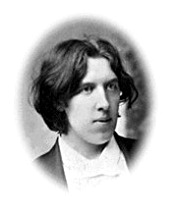 Oscar Wilde
Oscar Wilde
(1854 – 1900)
The Master
Now when the darkness came over the earth Joseph of Arimathea, having lighted a torch of pinewood, passed down from the hill into the valley. For he had business in his own home.
And kneeling on the flint stones of the Valley of Desolation he saw a young man who was naked and weeping. His hair was the colour of honey, and his body was as a white flower, but he had wounded his body with thorns and on his hair had he set ashes as a crown.
And he who had great possessions said to the young man who was naked and weeping, ‘I do not wonder that your sorrow is so great, for surely He was a just man.’
And the young man answered, ‘It is not for Him that I am weeping, but for myself. I too have changed water into wine, and I have healed the leper and given sight to the blind. I have walked upon the waters, and from the dwellers in the tombs I have cast out devils. I have fed the hungry in the desert where there was no food, and I have raised the dead from their narrow houses, and at my bidding, and before a great multitude of people, a barren fig-tree withered away. All things that this man has done I have done also. And yet they have not crucified me.
Oscar Wilde, 1894
fleursdumal.nl magazine
More in: Archive W-X, Wilde, Oscar, Wilde, Oscar
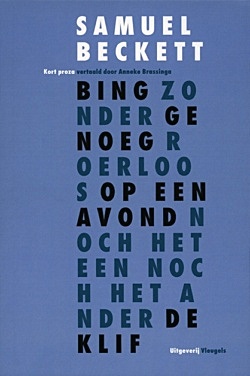 Samuel Beckett kreeg in 1969 de Nobelprijs voor de Literatuur. De in deze uitgave opgenomen vertalingen van Anneke Brassinga zijn alle geschreven in het decennium rond dit jaartal.
Samuel Beckett kreeg in 1969 de Nobelprijs voor de Literatuur. De in deze uitgave opgenomen vertalingen van Anneke Brassinga zijn alle geschreven in het decennium rond dit jaartal.
De teksten, die duidelijk minimalistisch van opzet zijn, kunnen het beste worden gesavoureerd met de stem – dus hardop gelezen. Daarbij komt de muzikale, repetitieve trant ten volle tot haar recht, evenals het poëtische aspect met veel assonantie en elliptische plastiek.
Beckett heeft al deze teksten nadrukkelijk gekarakteriseerd als verhalend proza, we kunnen er een soort bezweringen in horen van een bewustzijn dat aan zichzelf het eigen (voort)bestaan bewijst als een soort grensgebied tussen autonomie en ontlediging.
Samuel Beckett
Samuel Beckett (Dublin, 1906 – Parijs, 1989) was een Ierse (toneel) schrijver en dichter. Hij studeerde Frans, Italiaans en Engels in Dublin, reisde vervolgens door Europa om zich tenslotte permanent te vestigen in Parijs. Het merendeel van zijn werk schreef hij in het Frans, waarna hij het grotendeels ook weer zelf in het Engels vertaalde. Zijn teksten zijn vaak kaal, minimalistisch en diep pessimistisch over de menselijke natuur en de lotsbestemming van de mens. In 1969 ontving hij de Nobelprijs voor de Literatuur.
Samuel Beckett
Kort proza
Vertaling: Anneke Brassinga
48 pagina’s
isbn 978 90 78627 33 3
Uitgeverij Vleugels, 2017
€ 20,85
# meer info website uitgeverij vleugels
fleursdumal.nl magazine
More in: - Book News, Archive A-B, Samuel Beckett
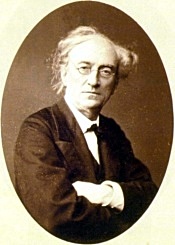
Fjodor Tjoettsjev
(1803 – 1873)
Een skaldenharp
O skaldenharp, zo ruw terzij gelegd,
in stof, in duisternis kwam jij terecht!
Maar straalde daar de toverende maan
met blauw-azuren schemerlicht jou aan,
dan werd jouw levendige klank gehoord,
een ziel was jij wier stilte werd verstoord.
Wat werd er in zo’n wonderlijke nacht
niet aan verleden aan het licht gebracht!
Klonk niet uit lang vervlogen tijden daar
de zang van een voorbije meisjesschaar,
in tuinen vrolijk bloeiend keer op keer
het trippelen van tienervoetjes teer?
Fjodor Tjoettsjev, Арфа скальда, 1838
Vertaling Paul Bezembinder, 2016
Een skald is een oud-Noorse hofdichter
Paul Bezembinder: zijn gedichten en vertalingen verschenen in verschillende (online) literaire tijdschriften. Zie meer op zijn website: www.paulbezembinder.nl
fleursdumal.nl magazine
More in: Archive S-T, Tjoettsjev, Tjoettsjev, Fodor
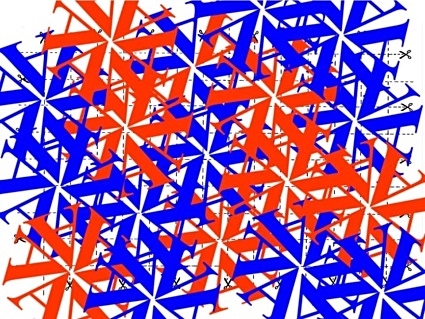
Sérgio Monteiro de Almeida
Poema visual: Presentation 10 (from the kaleidoscope series)
Sérgio Monteiro de Almeida cv:
Curitiba, Brazil (1964). Intermedia visual poet and conceptual artist. – He has published in numerous anthologies and specialized magazines in Brazil and outside; participated in exhibitions of visual poetry as International Biennial of Visual and Alternative Poetry in Mexico (editions from 1987 to 2010); Post-Art International Exhibition of Visual / Experimental Poetry, San Diego State University-USA (1988); 51 and 53 Venice Biennial (2005 and 2009). – He published in 2007 the book Sérgio Monteiro de Almeida with a global vision about his work as a visual artist and poet. – This book was incorporated into the “Artist Books” collection of the New York City Library (USA). – Author of the CD of kinetic visual poems (EU) NI/IN VERSO (still unpublished). – He presented urban interventions in Curitiba, San Diego, Seattle, New York, Paris, Rome. – In 2014 and 2015 visual poems published in the Rampike experimental literature magazine of the University of Windsor, Canada. – He recently had his poems published in Jornal Candido (n. 64) and Relevo (2015 and 2016).
More about his work:
Livro eletrônico http://issuu.com/boek861/docs/sergio_monteiro_libro;
Enciclopédia Itaú Cultural de artes visuais www.itaucultural.com.br;
Videos no Youtube: http://www.youtube.com/user/SergioMAlmeida
Sérgio Monteiro de Almeida
Curitiba – PR – Brazil
email: sergio.ma@ufpr.br
fleursdumal.nl magazine
More in: *Concrete + Visual Poetry K-O, Archive M-N, Sérgio Monteiro de Almeida
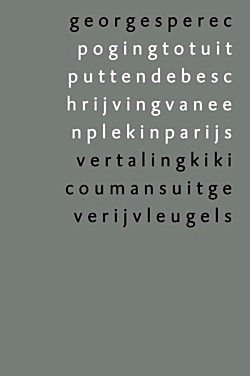 Drie dagen lang, in oktober 1974, posteerde Georges Perec zich in het Café de la Mairie in Parijs, dat uitkijkt op de Place Saint-Sulpice. Hij stelde zich tot doel álles te noteren wat hij waarnam. Het resulteerde in Tentative d’épuisement d’un lieu parisien.
Drie dagen lang, in oktober 1974, posteerde Georges Perec zich in het Café de la Mairie in Parijs, dat uitkijkt op de Place Saint-Sulpice. Hij stelde zich tot doel álles te noteren wat hij waarnam. Het resulteerde in Tentative d’épuisement d’un lieu parisien.
‘Mijn bedoeling op de volgende pagina’s was vooral al het andere te beschrijven: dat wat je gewoonlijk niet opmerkt, wat er niet toe doet: wat er gebeurt wanneer er niets gebeurt, behalve tijd, mensen, auto’s en wolken.’
Georges Perec (1936 – 1982) was een Franse schrijver, essayist en film- en documentairemaker. Hij was een vooraanstaand lid van de Oulipo-groep (Ouvroir de littérature potentielle), een los verband van Franstalige schrijvers en wiskundigen, dat als doel heeft literaire werken te maken die aan bepaalde voorwaarden of beperkingen onderhevig zijn: littérature sous contraintes. Het kan daarbij gaan om beperkingen inzake het gebruik van letters, woorden, klanken, stijlen, enz. Deze beperkingen zijn niet alleen bedoeld als woord- en taalspelletjes, maar ook om de inspiratie en het vakmanschap van de auteurs aan te scherpen.
De vader van Perec stierf vroeg in de Tweede Wereldoorlog, de moeder werd vermoord in de Holocaust. In veel werken van Perec komt dit terug in een thematiek omtrent afwezigheid, verlies en identiteit.
Georges Perec
Pogingen tot uitputtende beschrijving van een plek in Parijs
Vertaling: Kiki Coumans
Uitgeverij Vleugels, 2017
ISBN: 9789078627319
48 pagina’s
Prijs: € 19,45
# meer info website uitgeverij vleugels
fleursdumal.nl magazine
More in: - Book News, Archive O-P, Georges Perec, OULIPO (PATAFYSICA)

Concreted, Unli/oving
They lack in their memories, their being:
Thesmellofasummereveningwalking
downtotheriverwherefishareleaping
&theairisfullofmayfliesandfluff
fromtallreedsalongtheditches
withthesundazzlingingoldenslant;
Thefeeloficywindblastingacross
floodedlevelsbeforedawnwhenstars
aredimmingandtheeastbeginstobrighten
crunchingthroughfrozenpuddlesfeet
sinkingintothesoftnessofthemudbelow;
Thecoloursofbrowningleavesonbranches
alongtheridgeinhighchalkcountry
thevalleyspreadingoutinfront
withitslinesofhedgeautumncopses
&hereandtherehomesteadsincrystallight;
And because of this lack their every action
Brings a world concreted, unli/oving, one
Ending and not to be grasped in loss.
John Leonard
John Leonard lives in Canberra, Australia.
More poetry on website: www.jleonard.net
fleursdumal.nl magazine
More in: Archive K-L, Leonard, John
Thank you for reading Fleurs du Mal - magazine for art & literature